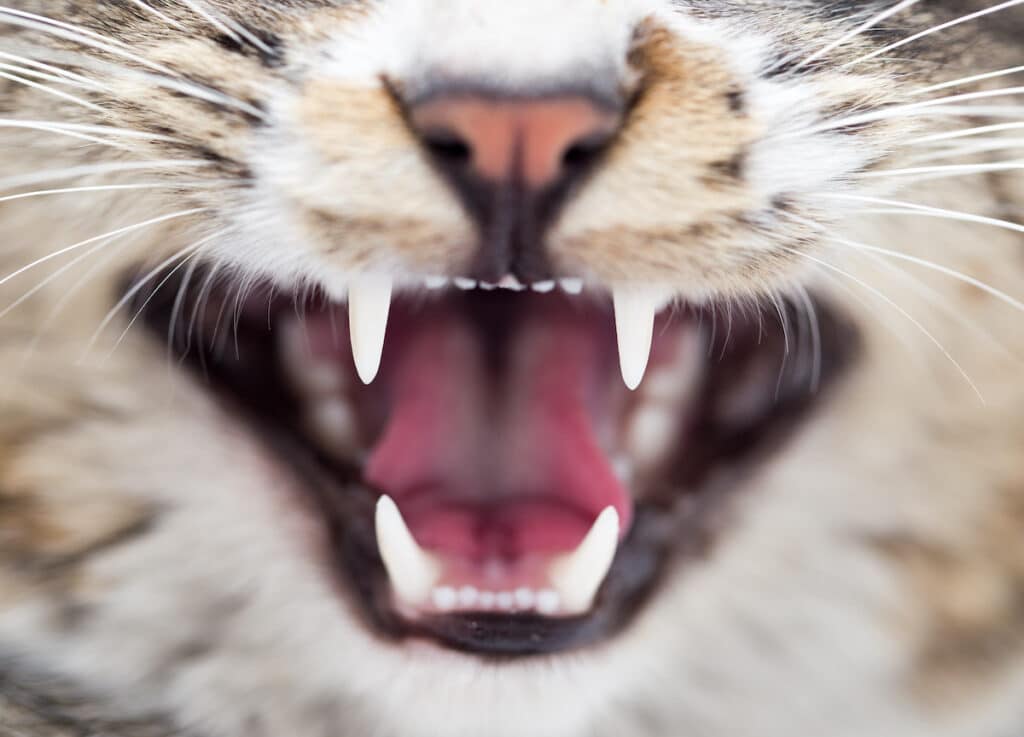There are many creatures that were built to be vicious hunters, from their enhanced sense of smell to the development of their fangs. To think of our feline pals as predators can be challenging. Cats, on the other hand, have a number of physical traits that make them superb hunters. They use their keen teeth to kill their prey as well as their vision, hearing, and sense of smell to hunt. They chew on kibble at home with these same teeth as well. Therefore, what occurs if a cat loses one or more teeth? How do they work? Will they regenerate?
Do cats’ teeth grow back?
While some animals, like sharks, can grow new teeth after losing them, cats cannot. Cats have 30 teeth at maturity, and they are the only teeth they will ever have. While cats who lose one or two teeth can still have completely normal lives, losing too many teeth might affect their health and their ability to chew.
Because of this, maintaining your cat’s teeth is crucial. Regular veterinary checkups and a proper brushing routine can prevent dental decay and tooth loss. No matter how hard you try, there are certain cats who will never agree to get their teeth brushed. In these circumstances, you ought to provide them dental hygiene treats like Virbac Enzymatic Hygiene Treats.
You can also think about putting a dental hygiene water additive like Oxyfresh in their regular water supply. It can aid in the fight against tartar and plaque buildup. This cat appears unbothered by getting his teeth brushed. He most likely grew accustomed to it as a kitten (or maybe he’s just a peculiar cat).
Can kittens regrow teeth?
Kittens are born toothless, much like newborns. In a few weeks, their baby teeth, which are their first set, will erupt. Around 11 weeks of age, they start losing these baby teeth, and when they do, their permanent adult teeth will erupt in their place. Kittens do lose their baby teeth, which are later replaced by adult teeth, even though they do not “regrow” them. If your kitty appears to need braces for a week or so, don’t worry! The holes in their gum line will soon close when the adult teeth erupt and take their place.
Given that your kitten will eventually lose their baby teeth, it can be tempting to neglect their dental health. The majority of kittens move into their new home at around 8 weeks old, and by the time they are 11 weeks old, they have already begun to lose their baby teeth. Baby teeth only have three weeks left in your care. Your kitten’s adult teeth, which appear after the age of 11 weeks, are the ones it will have for the remainder of its life. Some cats live to be over 20 years old. As a result, it’s wise to start caring for your kitten’s teeth as soon as they enter your home.
Regular tooth brushing can aid in preventing the bacteria, plaque, and tartar that may eventually result in periodontal disease in your kitten. The majority of cats actually dislike having their teeth brushed, so your best strategy is to start acclimating them to it as soon as you can. This will not only prevent tooth decay, but it will also make your kitten’s breath smell better. Keep your brushing sessions brief at first. Use toothpaste later rather than now. Praise your kitty the entire time as you softly and gently introduce the brush into its mouth. Until your kitten gets used to the sensation, repeat this action daily.
When you’re prepared to add toothpaste, make sure to choose a cat-specific variety, like Petrodex for Cats. Fortunately, there are types of cat toothpaste that cats enjoy, so your kitten might even become excited when they see you pull out their toothbrush!
Dental Issues
Your cat’s mouth suffers from periodontal disease, gingivitis, and other dental problems. Your cat’s gums may appear bright red, and his teeth may turn dark yellow when plaque accumulates at the gum line. He might drool excessively, bleed from the mouth, or have very bad breath as these diseases worsen. Teeth might fracture, become loose, or fall out entirely. He’ll probably lose his appetite and refuse to eat because chewing hurts. Sadly, it may now be necessary for your cat to undergo oral surgery.
How to Prevent Cats from Losing Teeth
You have a significant impact on whether your cat maintains all of its teeth throughout its life. In actuality, very little tooth brushing is often done by cats on their own, so it’s primarily your duty. The best way to avoid dental problems that could eventually result in tooth loss is to start brushing regularly as soon as possible. Make sure to use a cat-safe toothpaste like Petrodex for Cats and a brush manufactured specifically for cats like RosyLife Pet Toothbrushes.
These are fantastic since they include finger brushes in addition to conventional handle toothbrushes, which is useful if your cat cannot endure a lengthy toothbrush in their mouth. Every time your cat is examined, your veterinarian will look at its teeth. It’s a good idea to have your cat professionally cleaned if they advise you to. Even with routine home brushing, professional plaque removal is occasionally necessary.














